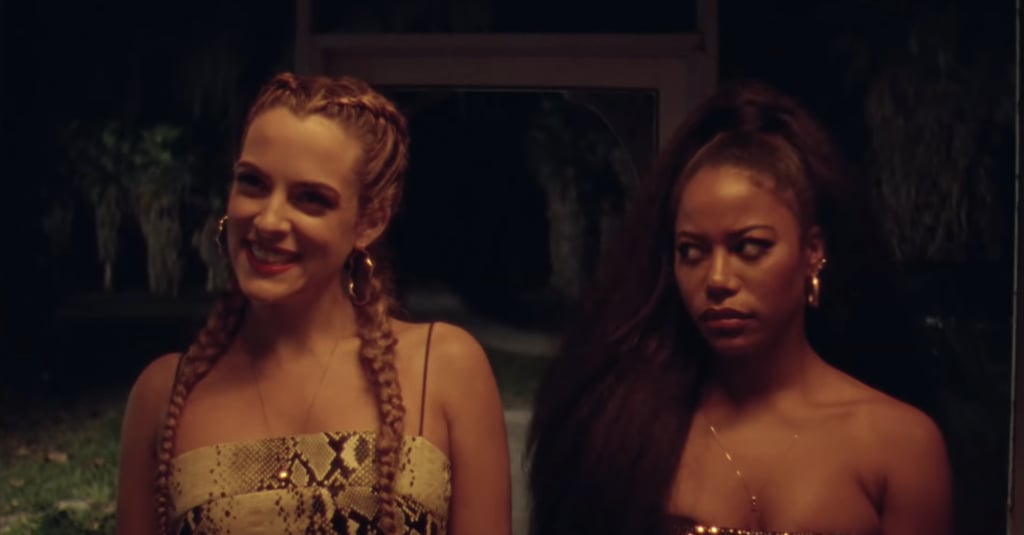
For better or worse, Twitter has increasingly played an important role first in our cultural zeitgeist and now in our politics and news cycle. But before the 45th President of the United States made the Twitter timeline a place to monitor to find out which direction the New York Stock Exchange would be headed for the day, a Twitter thread from exotic dancer and aspiring writer Aziah “Zola” King set the social media app aflame and forever changed the way it was used. Her 140+ tweet barrage about her falling out with another stripper and former friend made its way into mainstream media and, eventually, the radar of Hollywood. Now years after the fact, we see for the first time if social media infamy can translate off of an app and onto the big screen.
As longtime Twitter users already know, Zola is a retelling of one wild weekend experienced by its namesake, played by Taylour Paige, a Detroit waitress who strikes up a new friendship with a customer named Stefani (Riley Keough). After bonding over their work as exotic dancers, Stefani convinces Zola to join her for a weekend of dancing and partying in Florida. What at first seems like a glamorous trip full of “hoeism” rapidly transforms into a 48-hour journey involving a nameless pimp (Colman Domingo), an idiot boyfriend named Derrek (Nicholas Braun), some Tampa gangsters and other unexpected adventures.
The first thing about Zola that grabs you as a viewer is the craftswomanship displayed by director Janicza Bravo that gives the film a different feel to accompany the whirlwind story. Being a story borne out of Twitter, a platform used by a distinct minority of the population, how much the film acknowledged this origin could have been a choice that alienated audiences from the very onset. Bravo however cleverly immerses the film, and thus the audience, in the social media roots of the story onscreen both visually with the appearance of volume bars and the editing of certain shots and through the film’s sound design that mimics tweets being sent out, perfectly complimenting the voice-over narration of Zola which frames the story as though we are hearing her retell the bizarre story directly to us, complete with realistic pauses and descriptive explanation of her thoughts and feelings. This interpersonal style of storytelling evokes empathy in viewers that keeps you glued to the story throughout and invested in its conclusion.
While the film’s style does much to assist in drawing in the audience, the story itself is bonkers and entertaining enough to do so on its own. Zola is equal parts hilarious, dramatic, serious, and cautionary as we see the dark side of sex work and the avenues it can lead people down if they’re not careful and diligent with whom they trust and where they embark. Through Stefani’s story of being a single mother with not many people or job skills to depend on other than her body and an opportunistic older male predator who can help her capitalize off it financially, we see the vulnerability that young women who find themselves engaging in this type of work have, even through the film’s absurdity. Zola provides a glimpse into a world that many in the audience may not ever get to see up close and personal and through the wild ride we accompany the characters on, many will feel compelled to consider what some less fortunate people feel they have to do in order to make ends meet, creating empathy through entertainment.
Taylour Paige and Riley Keough are front and center in this film and both actresses deliver in spades, boldly announcing themselves onscreen for what will be the first time in the case of many in the audience. Paige deftly pulls double duty as not just the narrator of the story at hand, but also as the audience surrogate who, for much of the time, is just as aghast at this shit we are. Being the narrative and surrogate is a delicate balance that could be hard to pull off, particularly for such a young actress, but Paige is able to marry the two perfectly and just breaches the fourth wall without absolutely annihilating it and making the film feel too over the top. Keough also gives a revelatory performance as the manipulative Stefani, alternating between loathsome and sympathetic from scene to scene but always feeling authentic during her performance, a juggling act that is a testament to her acting ability. Colman Domingo continues his tear as a scene-stealing supporting actor as the mysterious handler turned pimp, adding just the right amount of pure menace to round out Stefani’s teetering on the line of antagonist role.
Zola is a one hell of a thrill ride that’s sure to make audiences laugh, recoil, and think, sometimes simultaneously. Director Janicza Bravo’s stylistic choice to integrate social media style shots, sounds, and narration from her lead character is a bold one that largely pays off, even if it confuses some viewers who are unfamiliar with how online culture works. Her cast mainly consisting of Taylour Paige, Riley Keough, Colman Domingo, and Nicholas Braun all do great work here with believable chemistry and Paige and Keough in particular carry the film with performances that are believable and evoke a range of emotion while watching. It’s hard to capture lightning in a bottle like King’s tweets, but Zola does it best to translate the moment to a different medium.
Image: A24

